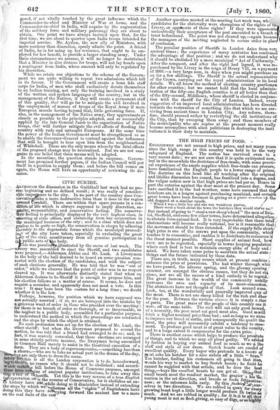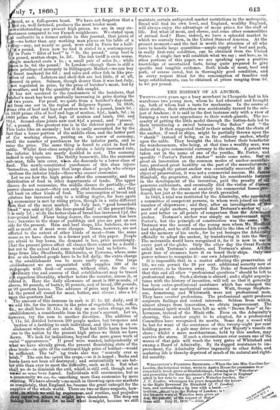• since the high range in this country was held
to be the very safeguard of England. The notion has survived, even to a very recent date ; we are not sure that it is quite extirpated now, but in the meanwhile the doctrines of free-trade with some practi- cal experience of the ample supplies which free-trade can procure, have familiarized the English people to a lower range of prices. The doctrine on this head like all teaching after the original and lifelike discussion has ceased, has fossilized into a dogma, and the vulgar notion now is that high prices are bad per se. Hence in 'part the outcries against the dear meat at the present day. Some have ascribed it to the bad weather, some have assumed that thy' butchers are in a league against purchasing mankind, and ce great towns have been foremost in giving us a prow" 1-..-....11-1,
old doggrel at a similar epoch. X
"When I was a little boy and eke was wondrous parvus, There went a bruit about the town the butchers they would stain us."
But instead of going to "steal a raw sheep's head" the men of Eris. tol, Sheffield, and some few other towns, have determined altogether), to abstain from animal food. It is very improbable that these total ' I the movement should be thus extended. If the supply falls sho i abstenations will become really national, nor is it reasonable that high price is one of the screws put upon the community, whic teaches it to economize, and enables it to distribute its resources i the freest manner possible. Short supplies of animal food, ho ever, are to be regretted, especially in towns keeping populatio where such food is best to maintain energy alike of body and I mind. We have taken some pains to ascertain the actual state. things and the future indicated by these data.
There are, in truth, many causes which at present combine ) enhance the price of provisions. The bad winter through whif we have passed, the adverse spring, and the gloomy opening,/ summer, are amongst the obvious causes, but they do not std alone, nor are all the causes of a kind entirely to be regrod. The great increase in the wealth of the community nattily increases the area, and capacity of its meat-oonsuthm. The abstainers have not thought of that. Look around iusee. Look, too, at the wonderfully and generally improved qtuy of the meat. There is not one sheep killed for the rich and thee for the poor. Between the various classes it in simply a .tter of parts. The great mass of the people of this country efts it were, off the same table. The rich will eat only good mean.d, -
of a necessity, the poor must eat good meat also. Good m will fetch a higher nominal price than bad ; and so long as we Ohne to improve our breed of cattle, and consequently the qualit the meat, the price will necessarily exhibit a tendency to aloe- ment. To produce good meat is of great value to the conpity, and to a large extent it compensates for the extra price. There is another cause which helps to produce thpres#tate of things, and to which we may all plead guilty. We a ided by fashion in buying our animal food as much as we a the stuff and style of our dress. Scotch beasts are smahd of excellent quality. Every buyer who pretends to a knowe of asks his butcher for a nice sirloin off a little "Sean." The butcher, finding his customers all going in that tion wends his. way to market to buy Scotch beasts ; he finhexist he Ze... cannot be supplied with that artaole, and, he does thieuutb:vset. thing,—buys the smallest beasts he can get at. Oiinethat small beasts meet the readiest market, the grazier); 4 na- tention. in the set direction and breeds or feeds f ness ; or the salesman kills- earls By this fashioe.4, our- selves in two directions. We are robbed in quail' for C every growing beast kept a little longer would produce 4k twice as much. And we are robbed in quality ; for it isit to an ta...z , young meat is not so flesh giving, so easy of dip, or so highly
*red, as a full-grown beast. We have not forgotten that a id ox, well fattened, produces the most tender meat. " otwithstanding our present high prices, we are in easy dr- stances compared to our French neighbours. We stated upon authority in a former article in this journal, that joints of —no better than any working man pieces on his table of a a —nay, not nearly so good, were sold in Paris for a half- a pound. Even now we find it stated in a contemporary in Paris " fillet of beef" is " 28. the pound," soup beef is pound, mutton chops, 18. 2d.. The fish tariff is even worse. gle mackerel costs a 18.; a small pair of soles 2s. ; while on is 3s. 6d. the pound ! In London—though there is still a in privilege of monopoly in Billingsgate Market—we can buy finest mackerel for 6d. ; and soles and other fish in like pro- on of cash. Lobsters and shell-fish are but little, if at all, ced in price. Salmon, though dearer than it was last July, not regulated in price, by the price of butcher's meat, but by e weather, and by the quantity of fish caught. It has not occurred to the condemners of the butchers, that tcher's meat has been gradually increasing in price during the .st two years. For proof, we quote from a butcher's day-book, ;id from one not in the region of Belgrave Square. In 1858, iiime ribs of beef and legs of mutton were 8d. a pound, lamb 9d. ; in 1859 prime ribs of beef and legs of mutton, 81d., lamb, 9d. ; in 1860 prime ribs of beef, legs of mutton and lamb, 10d. and
(3.01d. Second-class joints now cost 81,4. a pound, and "pieces," 7d. a pound. The greatest rise is in the inferior parts of meat. This looks like an anomaly ; but it is easily accounted for by the fact that a lesser portion of the middle class, and the better part of the working classes, putting on the screw of economy, swell the number of purchasers for the inferior parts, and so raise the price. The same thing is found to exist in food for cattle. Whilst first-class samples obtain a fairly increased rate, the inferior kinds are nearly doubled in cost. The economy indeed is only specious. The thrifty housewife, like the economic
t ,cab-man, falls into error, when she descends to a lower class of food. The newly-constituted purchasers of this class injure themselves, and also injure that large class of people who always =chase the inferior kinds—those who cannot economize.
Let us see how the high prices affect the community, and the distribution of food in other departments of trade. The upper ?lasses do not economize, the middle classes do partially,—the poorer classes caanot—they can only stint themselves ; and they all back -on other kinds of food. The consumption of bread and iotatoes has increased only to a trifling degree, for here again -21 economizer is met by rising prices, though in a ratio different m that of the meat market. In July last, "good household ad" was sold at 60. the four-pound loaf; at the present time, only 7d.; while the better class of bread has increased lid. the , four-pound loaf. Flour being dearer, the consumption has been less; luxuries in the shape of puddings and pies are put on one side for the present. Ham and beef shops, like butchers, do not sell as much as if meat were cheaper. Hams, however, are not affected to the extent of other kinds of meat—from the same cause as we have shown in a former part of this paper. People ere afraid to buy hams, the demand is less, price accordingly. That the present prices affect all classes there cannot be a doubt ; but not to the extent that some would have had us believe. In large firms like Shoolbreds, Hitchcocks, or Pawsons, where some five or six hundred people have to be fed daily, the extra charge m the establishment can be more easily seen. One large stablishment we are acquainted with supplies 300 of its people with food—of course, without stint, for the ex- rdinary rise and success of that establishment may be traced sagacious liberality, whether before the counter, across it, or Le ind it. Here the daily allowance of meat is 300 pounds, of cheese, 80 pounds, of butter, 36 pounds, and of bread, 360 pounds, or 90 quartern loaves. The advance of price may be taken at a Id. the pound all round for meat, butter, and cheese ; also a ld.
upon the quartern roar . I The amount of this increase in cash is 21. Is. 2d. daily, and if we add 108. for the increase in the price of vegetables, tea, coffee,
we shall have 2/. us. 2d. a day as an extra charge on the establishment, a considerable item in the year's account. Let us, however, try the sum in another direction. The addition of 7. 1-1s. 2d. divided between 300 people makes but twopence and -section of a farthing to each individual, and this too in an es- olishment where all are adults. That but little harm has been one to the nation, by the present high prices we think we have ;hewn. We look for indications, beyond the mere guess work of social "appearances." If proof were wanted, independently of what we have already given, the present flourishing state of the shoe trade—in spite of the continued high price of leather—would be sufficient. The tai'- 'Jag trade also was "scarcely ever so brisk." The sun ha:. saved the crops,—so it is hoped ; flocks and herds have not been all destroyed ; and substantially we are bet- ter able than ever to meet the difficulty, such as.it is. But what shall we do to diminish the evil, which is still evil, though not so hwii.-1 as snrwAave feared. Individuals will eneonomize, but as a community wee...2...• ./Au aomething more than economize by mere stinting. We have already cane much in throwing open our markets so completely, that England ha..hecome the great entrepOt for the supplies of the whole world. There ire two or three respects, how- ever, in which we still by supineness, and routine, and prejudice deny ourselves where we might have abundance. The deep sea fishing has not done for us half what it might, because we still
maintain certain antiquated market restrictions in the metropolis. Bread will find its own level, and England, wealthy England, will always enjoy the advantage of mean prices for the staff of life. But what of meat, and cheese, and some other commodities of animal food ? Here, indeed, we have a splendid market to which we scarcely turn, in the United States of America. At the present moment—and the fact is worth the attention of all who have to handle large quantities—ample supply of beef and pork, in really first-rate condition, can be obtained from the United States: A single feet will establish what we say ; and here, as in other portions of this paper, we are speaking upon a positive knowledge of ascertained facts, being quite prepared to give specific and tangible evidence. Both kinds of meat, beef and pork, of course cured, but in thoroughly good condition, and in every respect fitted for the consumption of families and large establishments, can be obtained at prices ranging from 3d. to 4d. per pound.



























 Previous page
Previous page